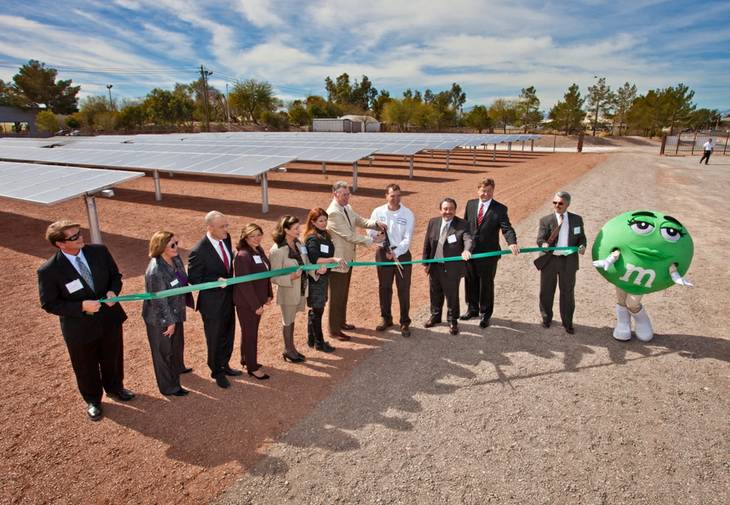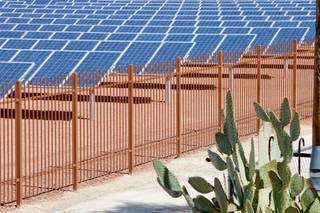Sun Archives
Map of Ethel M Chocolates
Environmentally minded candy lovers can now get their chocolate fix while still maintaining a clean conscience.
Henderson-based Ethel M Chocolates on Thursday unveiled its new “solar garden.” It features more than 2,000 solar panels that have the potential to produce enough energy to power the nearby factory where the chocolate is manufactured.
Construction on the 4.4-acre solar garden, adjacent to the cactus garden at Ethel M’s facility at 2 Cactus Garden Drive in Henderson, started last October and finished in December.
“We’re committed to giving (customers) the best quality chocolate in a sustainable way," said Mack Phillips, site director for Ethel M, which is owned by Mars Inc.
The Henderson solar field will produce about 1.29 million kilowatt hours annually, enough to power roughly 115 Nevada households for a year. During peak times, the panels will generate enough energy to fully power the chocolate factory.
Any excess energy will be fed back into the electrical grid, for which Ethel M will receive credits that can be used when it draws power from the grid in case the sun isn’t shining.
On Thursday morning, the solar panels slowly pivoted as they tracked the sun across the sky. Local politicians and business leaders gathered nearby to celebrate the project’s completion.
U.S. Sen. Dean Heller, R-Nev., and his challenger in the upcoming 2012 election, U.S. Rep. Shelley Berkley, D-Nev., were both on hand and sat next to each other.
Heller praised Mars for its commitment to becoming more sustainable without relying on subsidies from the federal government.
Berkley, a self-described “chocoholic,” said she hoped Ethel M would set an example for other businesses throughout the state looking to reduce their environmental impact.
“I’m hoping that corporations around the state of Nevada … see what Ethel M is doing and emulate it, because this could be the start of something special,” Berkley said.
Mars privately funded the project. In doing so, it reaffirmed a commitment to sustainability the company adopted long before renewable energy had become a hot topic for politicians and economists, Phillips said.
“We realized as one of the largest food manufacturers in the world that we needed to have other commitments than just making chocolate,” Phillips said. “Our impact on communities isn’t limited to the products we sell.”
The company has long used recycled materials and taken measures to lessen its water usage, Phillips said, and has begun using the sun, wind and even methane gas to power factories around the country in the past 10 years. The company’s ultimate goal, he said, is to eliminate its carbon footprint by 2040.
More and more companies switching to alternative energy sources will be needed in the future for Nevada to meet renewable energy standards enacted by the Legislature, said Tony Sanchez, NV Energy’s senior vice president of government and community strategy.
There are currently about 800 individual solar installations at businesses and homes throughout Nevada, Sanchez said, and the fact that Ethel M was able to build its solar field without public dollars is a good sign for the industry’s growth.
“This is a realization that this type of technology is becoming cost competitive,” he said. “And that’s a positive development for Nevada.”

